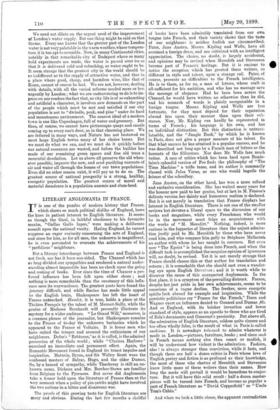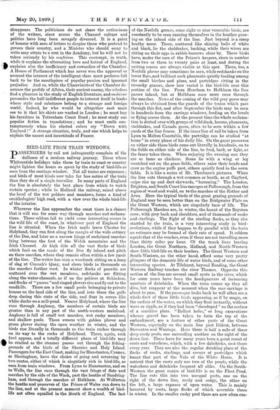LITERARY ANGLOMANIA IN FRANCE.
IT is one of the puzzles of modern history that France, which shows so much political dislike of England, bows the knee in patient interest to English literature. It seems as though the Gaul, in faithful obedience to his favourite maxim, "Gallus Gallo lupus," were making a deliberate assault upon the national vanity. Hating England, he cannot suppress an eager curiosity concerning the arts of England, and since for him, as for all men, the unknewn is magnificent, he is even persuaded to overrate the achievements of his " perfidious " neighbours.
But a literary interchange between France and England is not fresh, nor has it been one-sided. The Channel which has so long divided our sympathies and rendered a natural under- standing almost impossible has been no check upon the going and coming of books. Ever since the time of Chaucer a pro- found influence has been felt upon either shore ; and nothing is more remarkable than the constancy of this influ- ence save its waywardness. The greatest poets have found the journey difficult, and while Racine has made little appeal to the English brain, Shakespeare has left the heart of France untouched. Hamlet, it is true, holds a place at the Theatre Francais by the talent of M. Mounet-Sully, while the genius of Madame Bernhardt will presently illustrate its mystery for a wider audience. "Le Grand Will," moreover, is a common phrase of the journalist, but Shakespeare remains to the France of to-day the unknown barbarian which he appeared to the France of Voltaire. It is lesser men who have suited the temper and aroused the enthusiasm of our neighbours. Defoe's "Robinson," as it is called, is the admired possession of the whole world ; while "Clarissa Harlowe " exercised an immediate and permanent effect. Again, the Romantic Movement found in England its truest impulse and inspiration. Maturin, Byron, and Sir Walter Scott were the confessed masters of Balzac, Hugo, and the elder Dumas. So, by a hazard of sympathy, while Thackeray is still an un- known name, Dickens and Mrs. Beecher-Stowe are familiar from Belgium to the Pyrenees. But never did Anglomania take a firmer hold upon the literature of France than at the very moment when a policy of pin-pricks might have involved the two nations in a bitter and disastrous war.
The proofs of this growing taste for English literature are many and obvious. During the last few months a shelfful of books have been admirably translated from our own tongue into French, and their variety shows that the taste of our neighbours is neither foolish nor circumscribed. Pater, Jane Austen, Messrs. Kipling and Wells, have all assumed a foreign dress, and are criticised with an intelligent appreciation. The choice, no doubt, is largely accidental, and opinions may be revised when Meredith and Stevenson become part of France's heritage. But it is curious to notice the reception which has greeted these writers, so different in style and talent, upon a strange soil. Pater, of course, presents no difficulties to the French intelligence. He is to them, as for us, a man of letters, whose craft is all-sufficient for his ambition, and who has no message save the message of elegance. Had he been born across the Channel, he would have written no otherwise than he did, and his research of words is plainly recognisable in a foreign tongue. Messrs. Kipling and Wells are less fortunate, for they must depend for their reputation abroad less upon their manner than upon their sub- stance. Now, Mr. Kipling can hardly be represented in terms of French ; his language is his own, and has an individual distinction. But this distinction is untrans- lateable, and the "Jungle Book," by which he is known in Paris, does not give a proper measure of his talent. So that what success he has attained is a popular success, and he was described not long ago by a French man of letters as the laureate of the filibusters. Nor does Mr. Wells fare much better. A race of critics which has been bred upon Baude- laire's splendid version of Poe finds the philosophy of "The Time Machine" a trifle tame, and its author is summarily classed with Jules Verne, as one who would beguile the leisure of the schoolboy.
Jane Austen, on the other hand, has won a more refined and exclusive consideration. She has waited many years for the honour now paid to her genius, but at last in M. Feneon's delicate version her dainty and humorous realism is declared. But it is not merely in translation that France displays her interest in English literature. There is not one of the smaller reviews but devotes a liberal space to the discussion of our books and magazines, while every Frenchman who would be in the movement must feign an acquaintance with the works of "M. Mereditt." Nothing, indeed, is more curious in the fopperies of literature than the unjust admira- tion justly paid to Mr. Meredith by those who have never read him, and who compare him gaily to Stiphane Mallarme, an author with whom he has naught in common. But even now "The Egoist" is being done into French, and when the difficult task is accomplished the sanguine opinion of ignorance will, no doubt, be revised. Yet it is not merely strange that France should choose this or that author for translation and esteem ; it is remarkable that she should cast even a wander- ing eye upon English literature ; and it is worth while to discover the cause of this unexpected Anglomania. In the first place, it is a symptom of the prevailing distrust. France, despite her just pride in her own achievements, seems to be conscious of a vague decline. The fresher, more energetic spirits look abroad for example and inspiration. While the patriotic politicians cry "France for the French," Ibsen and Wagner exert an influence denied to Gounod and Dumas fi/s. And so England, with its brisker invention and lower standard of style, appears as an apostle to those who are tired of Zola's documents and Goncourt's preciosity. But above all, the admiration of English literature, seldom quite sincere and too often wholly false, is the result of what in Paris is called snobisme. It is nowadays tres-snob to admire whatever is made in London,—pictures, furniture, books ; and since snob in French means nothing else than smart or modish, it will be understood how violent is the admiration. Fashion, alas ! is always stronger than conviction, while it lasts, and though there are half a dozen critics in Paris whose love of English poetry and fiction is as profound as their knowledge, the most of those who chatter of Meredith and Stevenson know little more of these writers than their names. How long the mode will prevail it would be hazardous to conjec- ture. But it will have this solid result : half a dozen master- pieces will be turned into French, and become as popular a part of French literature as "David Copperfield" or "Uncle Tom's Cabin."
And u-hen we look a little closer, the apparent contradiction disappears. The politicians do not share the enthusiasm of the writers, since across the Channel culture and politics have long been savagely divorced. It is a point of honour with men of letters to despise those who pretend to govern their country, and a Minister who should essay to write may attain to a seat in the Academy, but he will not be taken seriously by his confrclres. This contempt, in truth, while it explains the alternating love and hatred of England, explains also the inefficiency and cowardice of the Chamber. A House of Parliament which has never won the approval or aroused the interest of the intelligent class must perforce fall back to be the mouthpiece of popular passion and ignorant prejudice. And so, while the Chauvinists of the Chamber de- nounce the perfidy of Albion, their ancient enemy, the scholars find a pleasure in the study of English literature, and snobisme persuades the half-indifferent people to interest itself in books whose style and substance belong to a strange and foreign world. Indeed, he who would be altogether snob must see to it that his shirts are washed in London ; he must buy his furniture in Tottenham Court Road ; he must study our popular fiction in translations ; and he must smile con- temptuously when his elected rulers cry "Down With England !" A strange situation, truly, and one which helps to explain the unrest and incertitude of France.







































 Previous page
Previous page